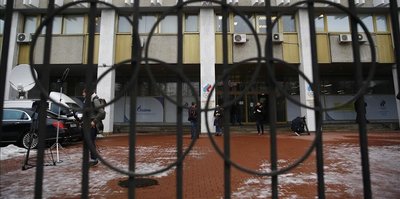The Koreas have agreed to march together at next month's Winter Olympics under a unified flag as well as taking the unprecedented step to field a joint women's ice hockey team during the event.
Seoul and Pyongyang delegations announced late Wednesday they will strengthen cooperation at the Games from February 9 in PyeongChang, South Korea.
It is more than a decade since the two sides last marched under a unified flag, while they have never formed a joint team for an Olympic event.
Wednesday's talks took place during a third round of inter-Korean dialogue since the North's leader Kim Jong-un called for participation at PyeongChang 2018 during his New Year's Day address. North Korea had altogether boycotted Seoul 1988, the only previous Olympics on the divided peninsula.
The International Olympic Committee will host officials from the Koreas in Switzerland this weekend to approve the agreement and iron out details of their cooperation amid concerns about a joint hockey team.
South Korean athletes have expressed worries about losing their places due to a merger with the North Korean hockey team, which is not currently strong enough to qualify for the Olympics. Meanwhile, other nations might object if a unified Korean squad is simply expanded to accommodate additions from the North.
South Korean hockey coach Sarah Murray admitted to reporters Tuesday that she was "shocked" to hear of the plan so close to the Olympics, having not been kept informed by Seoul. Murray also said she hopes she will not be pressured to field North Koreans in her team unless they earn ice time on merit.
Seoul's chief delegate to the ongoing working-level talks with North Korea, Vice Unification Minister Chun Hae-sung, insisted at a press briefing Wednesday night that showing unity through a joint march and hockey team "is very meaningful."
According to local news agency Yonhap, Chun also sent out a reminder that South Korea is hoping to improve ties in order to resolve the standoff over North Korea's rogue development of nuclear weapons.
Pyongyang is having to operate under heavy sanctions due to repeated nuclear and missile tests, so the Koreas are having to work out how to cooperate without breaking obligations to the United Nations. Such an infringement might include South Korean financial support.
As things stand, the North looks set to send a delegation of over 400 athletes, officials and performers to the South via their land border in order to avoid sea route restrictions.
Inter-Korean travel by road was blocked in early 2016 when bilateral ties completely collapsed under the South's former President Park Geun-hye.























